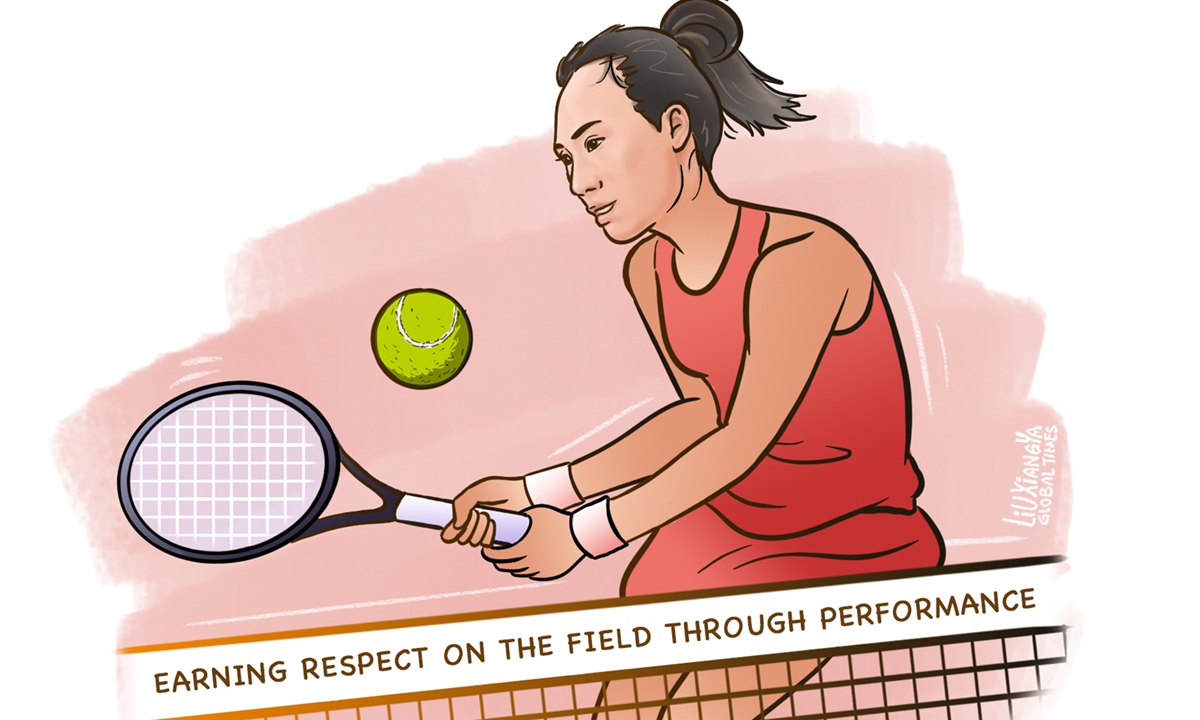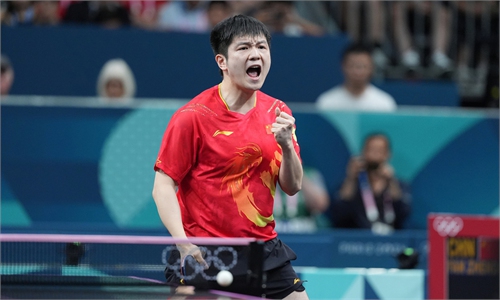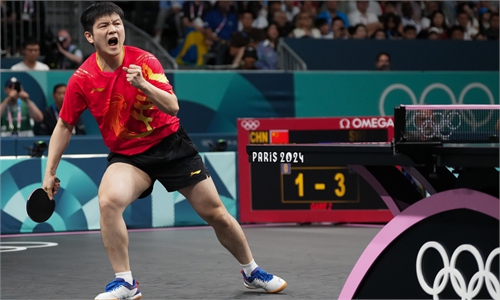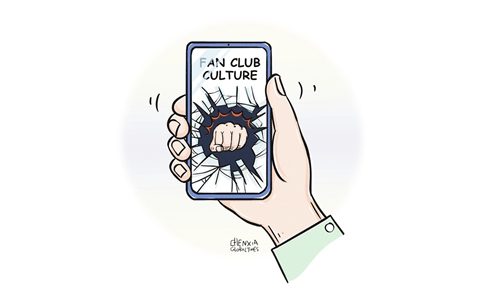ARTS / CULTURE & LEISURE
Zheng Qinwen disbands fan group, shows performance on site true foundation for athletes

Illustration: Liu Xiangya/GT
Chinese tennis player Zheng Qinwen recently announced to disband fan group linked to her account on social media platform Sina Weibo. Many expressed supports for her decision, saying that an athlete's primary focus should be on earning respect and accolades on the field through their performance, rather than responding to the expectations from fans and chasing fleeting fame from media buzz.As an athlete on the Asia-Pacific U30 Young Leaders list with athletes including Sun Yingsha, Quan Hongchan, and Pan Zhanle, Zheng infuses new symbolic significance into the development of Chinese sports. The growth paths of these young athletes demonstrate that the core of sports competition remains rooted in skill and professionalism, rather than excessive external packaging or idolization.
"While fan support is certainly important, Zheng Qinwen's decision to disband her fan group demonstrates her determination to focus on improving her own skills and mindset, turning excessive external pressure into an inner driving force," sports commentator Wang Dazhao told the Global Times.
Wang pointed out that athletes are a professional group focused on competitive performance, and some excessive behaviors within fan culture can distract them or even disrupt their rhythm.
In fact, Zheng had previously expressed a longing to focus on competitions and leading a normal life. During her participation in the Tokyo Olympics, she said, "It's nice to return to a normal person's life," and shared an incident in which she was delayed for 40 minutes because someone asked for her autograph.
During a previous match, some overly enthusiastic cheers from the audience even disrupted Zheng's rhythm. This phenomenon not only caused her stress, but also led her to reflect on healthy interactions between athletes and fans.
Such reflection has also been extended to her interactions with peer competitors. Ahead of the WTA Finals, Zheng stated that she preferred to keep a distance from other players, explaining, "If I become friends with someone, I won't be able to fully focus on competing against them."
Her actions - whether disbanding her fan group or maintaining boundaries with players - reflect a clear professional mindset. Zheng is well aware of the fierce competition in the world of tennis, a sport with one of the highest levels of professionalism and global talent density. Only by constantly maintaining her best competitive form can she continue to make breakthroughs.
Such a professional attitude deserves recognition and also serves as a reminder to fans that moderate and rational support is the best way to follow idols. Instead of emphasizing excessive enthusiasm, it is better to create a purer competitive environment for athletes through thoughtful and balanced support.
2024 has been a highlight year in Zheng's career. From being the runner-up at the Australian Open to winning the women's singles gold medal at the Paris Olympics, the 22-year-old Zheng has been constantly breaking personal, national, and even Asian records, all under the watchful eyes of countless fans.
Li Zhengyan, a former member in Zheng's Sina Weibo fan group, told the Global Times that she felt a sense of regret upon hearing about the disbandment of the fan group, but after thinking it through, she understood Zheng's intentions.
"As a professional athlete, she needs a purer environment to focus on her competition. The best way we can support her is to respect her choices and quietly assist her on her athletic journey," Li said.
"Going forward, we can cheer for her achievements and be moved by her dedication by focusing on every match she plays. I believe this 'invisible' support will be even more powerful and lasting," she noted.
Li expressed that Zheng's move provides a mirror for the future development of fan culture in the sports world. Through her actions, Zheng conveyed a signal that performance and results on the field are the true foundation for any professional athlete, while rational and respectful fan support forms the strong backing on the road to success.
Zheng is not the only star athlete that disbanded her fan group. Pan Zhanle, who shone in the swimming events at the Paris Olympics, also disbanded his fan group after the Olympics, receiving support from netizens.
In the modern era of highly commercialized sports, the relationship between sports stars and their fans are often related, whether it's for the promotion of the sport or the athlete's own commercial value. The former needs the latter's cheers and support to unleash greater potential on the field, while the latter needs the former's brilliance to infuse hope and dreams into their ordinary lives. However, the admiration and adoration that fans have for star athletes should be positive and healthy and based on mutual encouragement and growth on an equal footing.
"Fan culture itself isn't inherently negative, but it requires guidance and regulation," Wang said. "In sports, the core value of fans should be to help athletes achieve higher goals. In this process, athlete teams and relevant managers should take on more responsibility, actively communicating and guiding fans to transform their support into positive energy."
Be it Zheng, Pan, or any athlete, maintaining a sense of boundaries and ensuring that support does not become disruptive is the best form of blessing and the greatest form of support.
The author is a reporter with the Global Times. life@globaltimes.com.cn



